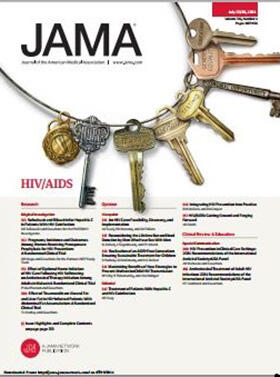
LSTM Researchers found that offering adults in Malawi optional home initiation of care following HIV self-testing resulted in a significant increase in the proportion of adults initiating antiretroviral therapy (ART) compared with standard HIV care.
The results are part of a study that was funded by the Wellcome Trust and published in the July 23/30 issue of JAMA, which is HIV/AIDS themed and released early to coincide with the International AIDS Conference taking place in Melbourne, Australia next week.
In 2012 it was estimated that 35 million people worldwide were living with the human immunodeficiency virus (HIV). ART not only substantially reduces the risk of HIV transmission but also greatly reduces illness and death, which raises hopes that a high uptake of annual HIV testing and early initiation of ART could improve HIV prevention as well as care.
HIV self-testing, where an individual performs and interprets their own HIV test in private, is a novel approach that has been high acceptability in Malawi and the United States. HIV self-testing can overcome barriers to conventional facility- and community-based testing that lack privacy and convenience.
Dr Peter MacPherson of LSTM and the Malawi-Liverpool-Wellcome Trust Clinical Research Programme, and colleagues, recruited 16,660 adult residents of Blantyre, Malawi, where nearly one in five adults are infected with HIV. Participants received access to HIV self-testing through community volunteers and were randomised to receive either facility-based HIV care, or optional home initiation of HIV care following reporting of a positive HIV self-test result.
During the six months of availability, 58% of all adult participants took an HIV self-test kit. A significantly greater proportion of adults in the home group initiated ART (181/8,194; 2.2%) compared with the facility group (63/8,466; 0.7%). Participants in the home group (6.0%) were also significantly more likely to report a positive HIV self-test result to counsellors than facility group participants (3.3%).
Dr MacPherson said: “These results are extremely encouraging. Our study found that population-level ART initiations were increased by the availability of home initiation of care. We know that early uptake of ART can help prevent HIV infections, as well as dramatically improve health”.
“At a time when universal test and treat approaches to controlling the HIV epidemic are being considered, home initiation of HIV care shows high promise as a simple strategy to improve the uptake of ART when HIV self-testing is carried out at home.”
MacPherson P, Lalloo DG, Webb EL, et al. Effect of Optional Home Initiation of HIV Care Following HIV Self-testing on Antiretroviral Therapy Initiation Among Adults in Malawi: A Randomized Clinical Trial. JAMA.2014;312(4):372-379. doi:10.1001/jama.2014.6493.